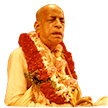Reaction - an essential subject: Difference between revisions
(Created page with "Category:Essential Subjects <!----------------------- edit below this line -----------------------> <!------------------------ begin introduction text below --------------...") |
(Vanibot #0041: Moves Choose Another box to the end) |
||
| Line 2: | Line 2: | ||
<!----------------------- edit below this line -----------------------> | <!----------------------- edit below this line -----------------------> | ||
<!------------------------ begin introduction text below ------------------------> | <!------------------------ begin introduction text below ------------------------> | ||
One cannot be engaged in the penance of devotional service without being completely free from all sins. As stated in the Bhagavad-gītā, only a person who is completely free from all reactions of sins can engage himself in the worship of the Lord. Brahmājī was sinless, and therefore he faithfully discharged the advice of the Lord, "tapa tapa," and the Lord, being satisfied with him, awarded him the desired result. Therefore only love and penance combined can please the Lord, and thus one is able to attain His complete mercy. He directs the sinless, and the sinless devotee attains the highest perfection of life. | |||
Srila Prabhupada's books, lectures, conversations and letters offer a comprehensive presentation of this essential subject as seen in the Vaniquotes '''[[Vaniquotes:Category:Reaction|Reaction]]''' category. An introduction from his books is given below in the following | Srila Prabhupada's books, lectures, conversations and letters offer a comprehensive presentation of this essential subject as seen in the Vaniquotes '''[[Vaniquotes:Category:Reaction|Reaction]]''' category. An introduction from his books is given below in the following 8 quotes. | ||
<!-------- end introduction text and don't touch next three lines ---------> | <!-------- end introduction text and don't touch next three lines ---------> | ||
---- | ---- | ||
== Quotes from Srila Prabhupada's books == | == Quotes from Srila Prabhupada's books == | ||
<!----------------- edit quote boxes below this line -----------------> | <!----------------- edit quote boxes below this line -----------------> | ||
{{VaniQuotebox| | {{VaniQuotebox|A man engaged in devotional service rids himself of both good and bad reactions even in this life. Therefore strive for yoga, which is the art of all work|A man engaged in devotional service rids himself of both good and bad reactions even in this life. Therefore strive for yoga, which is the art of all work. Since time immemorial each living entity has accumulated the various reactions of his good and bad work. As such, he is continuously ignorant of his real constitutional position. '''(Bhagavad-gītā 2.50)'''}} | ||
{{VaniQuotebox| | {{VaniQuotebox|A great scientist may make discoveries in atomic energy for the quick destruction of the world, but he has to undergo the reactions of his work by rotating in the cycle of repeated births and deaths under the superhuman law of material nature|A great scientist may make discoveries in atomic energy for the quick destruction of the world and may be awarded the best prize in recognition of his service (or disservice), but he also has to undergo the reactions of his work by rotating in the cycle of repeated births and deaths under the superhuman law of material nature. '''(Śrīmad-Bhāgavatam 3.9.10)'''}} | ||
{{VaniQuotebox| | {{VaniQuotebox|A devotee is not subjected to the reactions resulting from past deeds|A devotee is not subjected to the reactions resulting from past deeds. In the Brahma-saṁhitā it is said, karmāṇi nirdahati kintu ca bhakti-bhājām: (Bs. 5.54) for devotees the results of past pious and impious activities are nullified by the Supreme Personality of Godhead. The words ārabdhān eva mean "as if achieved by past deeds," but in the case of Pṛthu Mahārāja there was no question of reaction to past deeds, and thus the word eva is used here to indicate comparison to ordinary persons. '''(Śrīmad-Bhāgavatam 4.21.11)'''}} | ||
{{VaniQuotebox| | {{VaniQuotebox|A devotee should expertly manage to think always of the Supreme Lord so that the reactions of suffering cannot touch him. This is the expert management of papa-punya - pious and impious activities|A devotee should expertly manage to think always of the Supreme Lord so that the reactions of suffering cannot touch him. This is the expert management of pāpa-puṇya-pious and impious activities. An exalted devotee like Prahlāda Mahārāja is jīvan-mukta; he is liberated even in this very life in the material body. '''(Śrīmad-Bhāgavatam 7.10.13)'''}} | ||
{{VaniQuotebox| | {{VaniQuotebox|If one performs activities for the satisfaction of the Supreme Personality, the yajna-purusa, his work does not produce reactions, whereas karmis, who act for themselves, are bound by the reactions of their work|If one performs activities for the satisfaction of the Supreme Personality, the yajña-puruṣa, his work does not produce reactions, whereas karmīs, who act for themselves, are bound by the reactions of their work. A liberated person, therefore, does not think about whatever he has ignorantly done in the past; instead, he acts in such a way that he will not produce another body by fruitive activities. '''(Śrīmad-Bhāgavatam 5.1.16)'''}} | ||
{{VaniQuotebox| | {{VaniQuotebox|The actual explanation of pradhana, however, is given here: when the cause and effect are not clearly manifested (avyakta), the reaction of the total elements does not take place, and that stage of material nature is called pradhana|The actual explanation of pradhāna, however, is given here: when the cause and effect are not clearly manifested (avyakta), the reaction of the total elements does not take place, and that stage of material nature is called pradhāna. Pradhāna is not the time element because in the time element there are actions and reactions, creation and annihilation. '''(Śrīmad-Bhāgavatam 3.26.10)'''}} | ||
{{VaniQuotebox| | {{VaniQuotebox|The clouds, darkness and snowfall can cover only a very insignificant portion of the sun's rays. Similarly, the modes of material nature may react upon the raylike living entities|The clouds, darkness and snowfall can cover only a very insignificant portion of the sun's rays. Similarly, the modes of material nature may react upon the raylike living entities. It is the misfortune of the living entity, certainly not without reason, that the influence of the material energy acts on his pure consciousness and eternal bliss. '''(Śrīmad-Bhāgavatam 3.7.9)'''}} | ||
{{VaniQuotebox| | {{VaniQuotebox|The chanting of the holy name of the Lord is able to uproot even the reactions of the greatest sins. Therefore the chanting of the sankirtana movement is the most auspicious activity in the entire universe. Please try to understand this|The chanting of the holy name of the Lord is able to uproot even the reactions of the greatest sins. Therefore the chanting of the saṅkīrtana movement is the most auspicious activity in the entire universe. Please try to understand this so that others will take it seriously. '''(Śrīmad-Bhāgavatam 6.3.31)'''}} | ||
<!----------------- edit quote boxes above this line -----------------> | <!----------------- edit quote boxes above this line -----------------> | ||
| Line 31: | Line 31: | ||
'''Reaction - [[Vaniquotes:Category:Reaction|explore more within this category]]'''. | '''Reaction - [[Vaniquotes:Category:Reaction|explore more within this category]]'''. | ||
{{EsentialSubjectTotal}} | {{EsentialSubjectTotal}} | ||
<div style="float:left;"> | |||
{{EssentialSubjectnav}} | |||
</div> | |||
__NOTOC__ | __NOTOC__ | ||
__NOEDITSECTION__ | __NOEDITSECTION__ | ||
Latest revision as of 17:18, 22 November 2020
One cannot be engaged in the penance of devotional service without being completely free from all sins. As stated in the Bhagavad-gītā, only a person who is completely free from all reactions of sins can engage himself in the worship of the Lord. Brahmājī was sinless, and therefore he faithfully discharged the advice of the Lord, "tapa tapa," and the Lord, being satisfied with him, awarded him the desired result. Therefore only love and penance combined can please the Lord, and thus one is able to attain His complete mercy. He directs the sinless, and the sinless devotee attains the highest perfection of life.
Srila Prabhupada's books, lectures, conversations and letters offer a comprehensive presentation of this essential subject as seen in the Vaniquotes Reaction category. An introduction from his books is given below in the following 8 quotes.
Quotes from Srila Prabhupada's books
Reaction - explore more within this category.
Vanipedia has now over 903 introductory articles compiled from Srila Prabhupada's books under the series titled Essential Subjects. All these articles can be seen in the Table of Content on the right side of this article and also here in this Umbrella Category. Browse through them to relish the breadth and depth of Srila Prabhupada's teachings - There is a subject for everyone.






